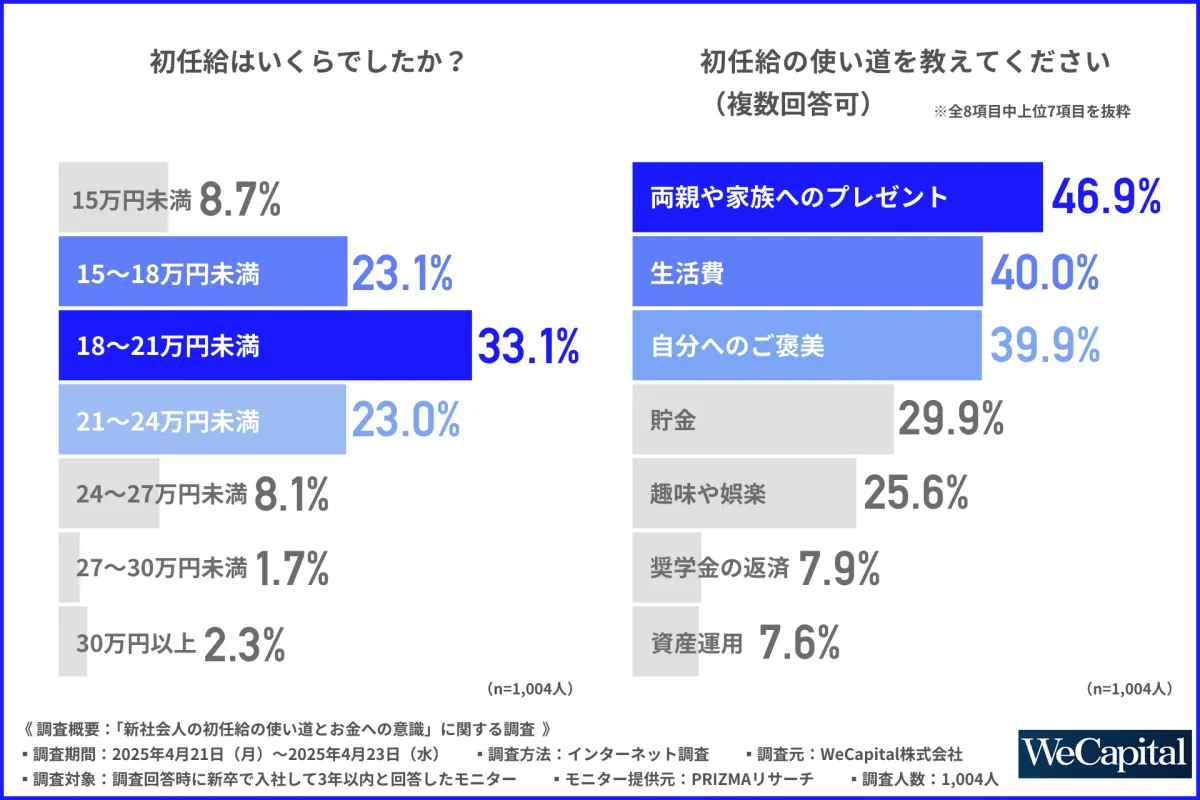

Understanding How New Graduates Allocate Their First Salary and Financial Concerns
Shift in Financial Perspectives Among New Graduates
In recent years, there has been a notable trend in Japan where large companies are increasing the starting salaries for new graduates. This phenomenon raises questions about how these young professionals are utilizing their first paycheck and their overall attitude towards financial management. WeCapital, the company behind Yamawake, conducted a study to delve deeper into the spending habits and money-related concerns of individuals within their first three years of employment.
Survey Overview
The survey targeted 1,004 respondents who had recently entered the workforce. Here are some key findings:
- - Majority of new graduates (33.1%) reported their first salary was between 180,000 and 210,000 yen.
- - The top expenditure reported was on gifts for parents and family, with approximately 46.9% of respondents indicating this as their primary use for their first salary.
- - Around 50% expressed dissatisfaction with their current disposable income, underscoring the challenge of balancing lifestyle expenses against salaries.
- - An alarming 56.9% of participants felt that tax and insurance deductions in the second year of employment were too high, which diluted their potential savings.
- - Worry over financial future topped concerns, with 28.9% citing inability to save as their main issue.
Salary Allocation: A Gesture of Gratitude
When respondents were asked how they spent their initial salaries, nearly half shared that they chose to buy gifts for their families, showcasing a strong sense of gratitude towards those who supported their journey to employment. Examples from respondents include:
- - Gifting Experiences: A young woman from Tokushima treated her parents to yakiniku (Japanese BBQ) to celebrate her graduation.
- - Essential Expenses: Many reported allocating their salaries towards basic living costs and loan repayments. For instance, a young individual from Hiroshima mentioned that their payment went towards necessary expenditure, reflecting the pressing financial responsibilities many face.
This emphasis on familial support highlights how the first salary is not merely perceived as personal earnings but also as a means to express appreciation.
Satisfaction with Current Income
Despite the proud moment of receiving their first paycheck, many respondents indicated that they were not wholly satisfied with their take-home pay. Only 19.5% claimed they had sufficient funds for savings and hobbies, while a staggering 45% stated they were just managing to make ends meet. Furthermore, 23.9% admitted to barely scraping by, which is unsettling for newly minted professionals.
When asked about overall satisfaction with their take-home salaries, diverse perspectives emerged:
- - Satisfied Earners: Some expressed contentment, stating their salary is adequate for living expenses and savings goals.
- - Unsatisfied Perspectives: Conversely, numerous respondents believed their salary fell short, primarily due to student loans and living costs.
The Shadow of Tax Deductions
A significant point of concern for many new entrants to the professional world is the realization of tax and social insurance deductions. Over half of respondents felt these deductions were exorbitant, leaving them to grapple with a stark contrast between gross income and net take-home pay. This leads to an unsettling realization that financial freedom is not easily attainable.
Future Financial Anxiety
An overarching theme of the survey indicated that new graduates are increasingly aware of long-term financial management. When questioned about future anxieties, the inability to save emerged as the greatest concern. Factors such as rising living costs and an uncertain economic climate are creating barriers to effective financial planning. Many respondents also expressed worries about future family formation, retirement funds, and the possibility of escalating living expenses that could exacerbate their current financial challenges.
Conclusion: A Balancing Act
In conclusion, the initial salary for new graduates serves as both a financial starting point and a catalyst for deeper reflection on money management. The findings reveal a generation keenly aware of the importance of balancing gratitude, personal responsibility, and future planning. As they navigate the early years of their careers, many young professionals demonstrate a prudent approach to fiscal matters, indicating a growing recognition that financial literacy is crucial in addressing their concerns. Wealth management strategies and asset growth options appear paramount for young professionals eager to secure their financial futures. The results of this survey provide essential insights for businesses and policymakers alike, highlighting an urgent need for financial education programs tailored to the realities facing new graduates today.
For a detailed look at the survey and its findings, visit Yamawake Journal.



Topics Consumer Products & Retail)










【About Using Articles】
You can freely use the title and article content by linking to the page where the article is posted.
※ Images cannot be used.
【About Links】
Links are free to use.